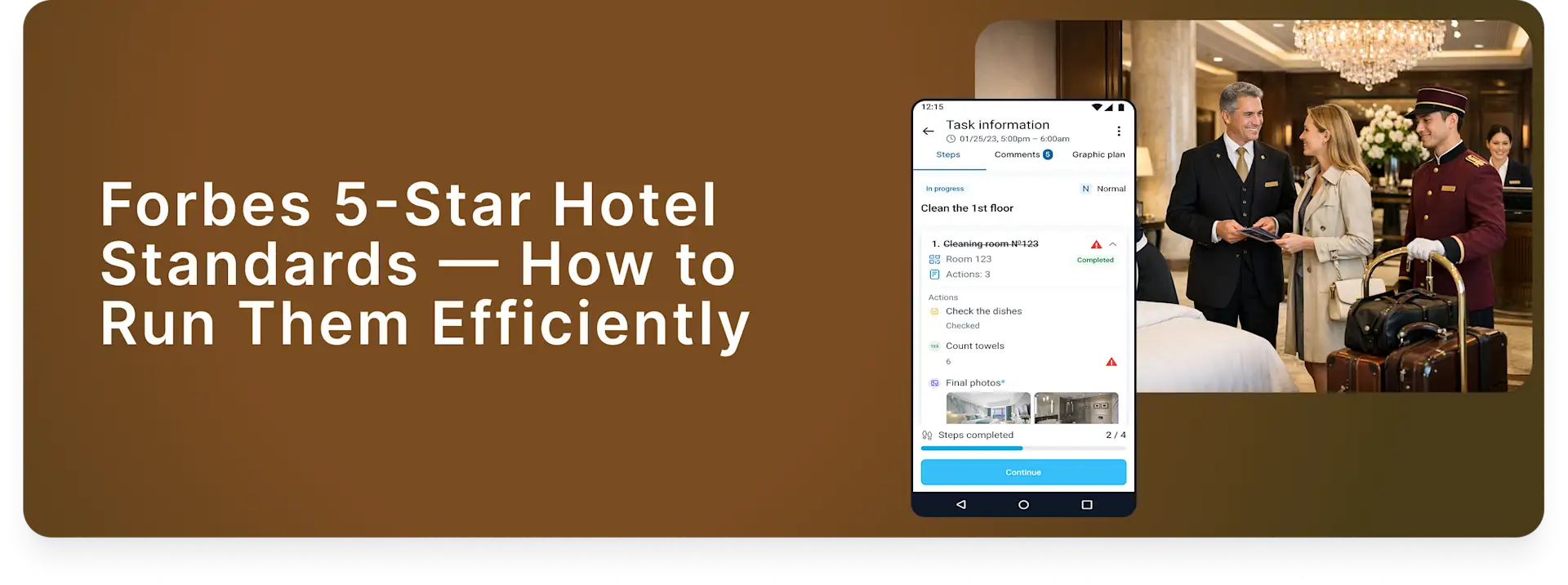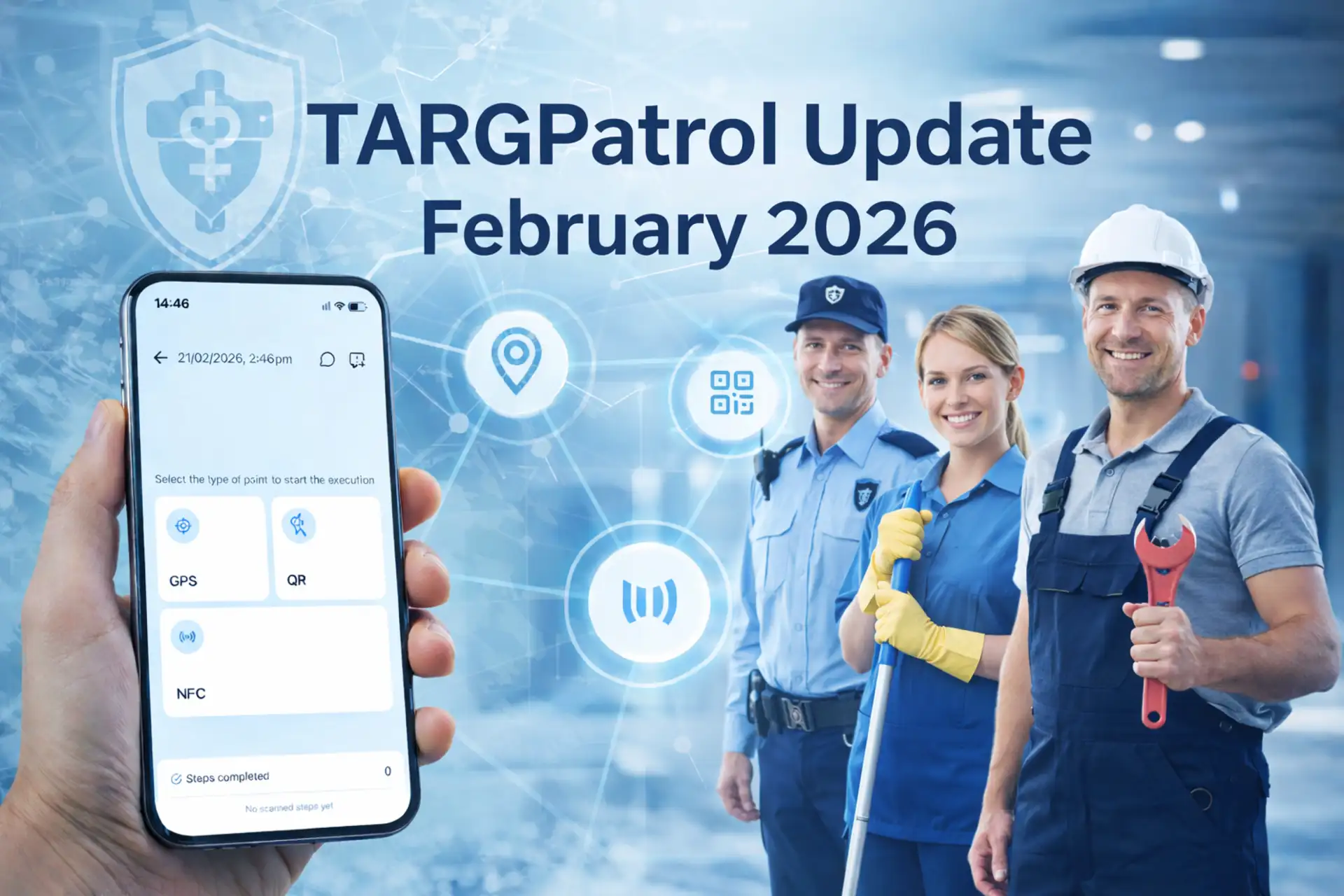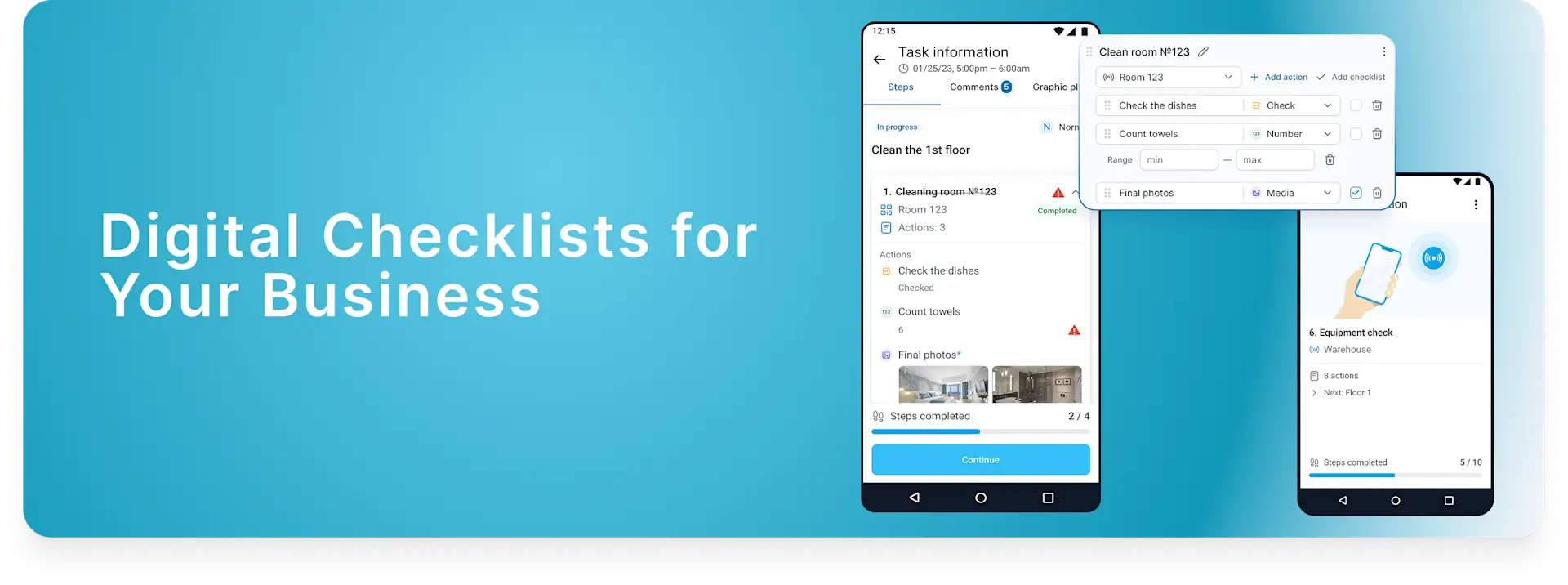Top 5 Retail Audit Apps for Stores in 2025
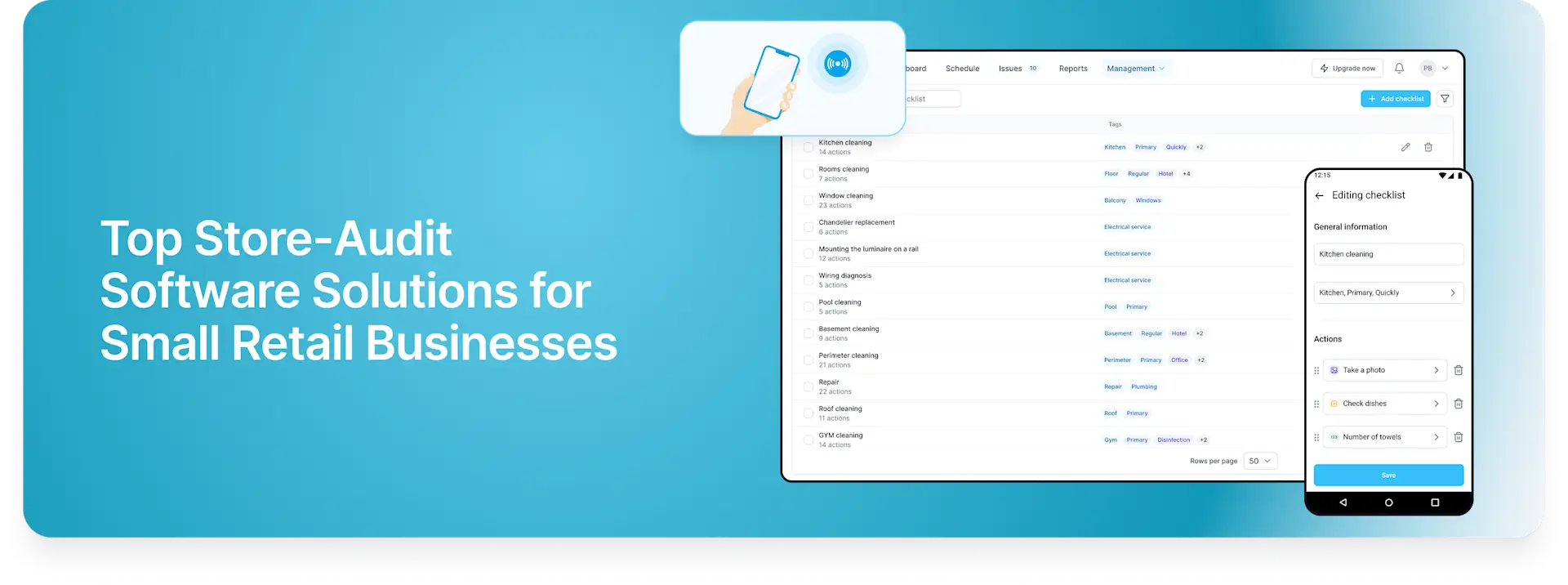
Top 5 Store-Audit Software Solutions for Small Retail Businesses
Scuffed tiles that snag stroller wheels, half-lit exit signs, or the one size missing from the rack — shoppers see every lapse. A scheduled store walk flips that reactive scramble into a proactive routine: the moment a manager steps onto the sales floor with a mobile device, every aisle, endcap, and fire door is suddenly under a spotlight. Safety comes first (a blocked exit can close a store and invite fines), brand consistency follows, and — done on a fixed cadence — inspections become dress rehearsals rather than dreaded pop quizzes.
Digital tools turbo-charge this ritual, replacing clipboards with data-rich, always-on workflows. Look for:
Mobile audit apps with dynamic templates, offline mode, and real-time scoring.
Geo-verified check-ins via GPS, QR, or NFC to stop “pencil-whipped” reports.
Multimedia evidence and voice-to-text notes that turn vague findings into actionable tasks.
Automated workflows that assign owners, deadlines, and escalations the instant an item fails.
Role-based dashboards and API connectors that feed results into HR, maintenance, or BI tools.
IoT sensors or AI vision for 24/7 monitoring of cold-chain units, planograms, and safety zones.
Below are the five platforms doing this best in 2025, what makes each shine, plus pricing, pros, and cons.
1. iAuditor (SafetyCulture)
iAuditor (SafetyCulture) – a template-rich mobile inspection platform that turns paper store walks into dynamic, media-driven checklists and delivers polished PDF or web reports in seconds.
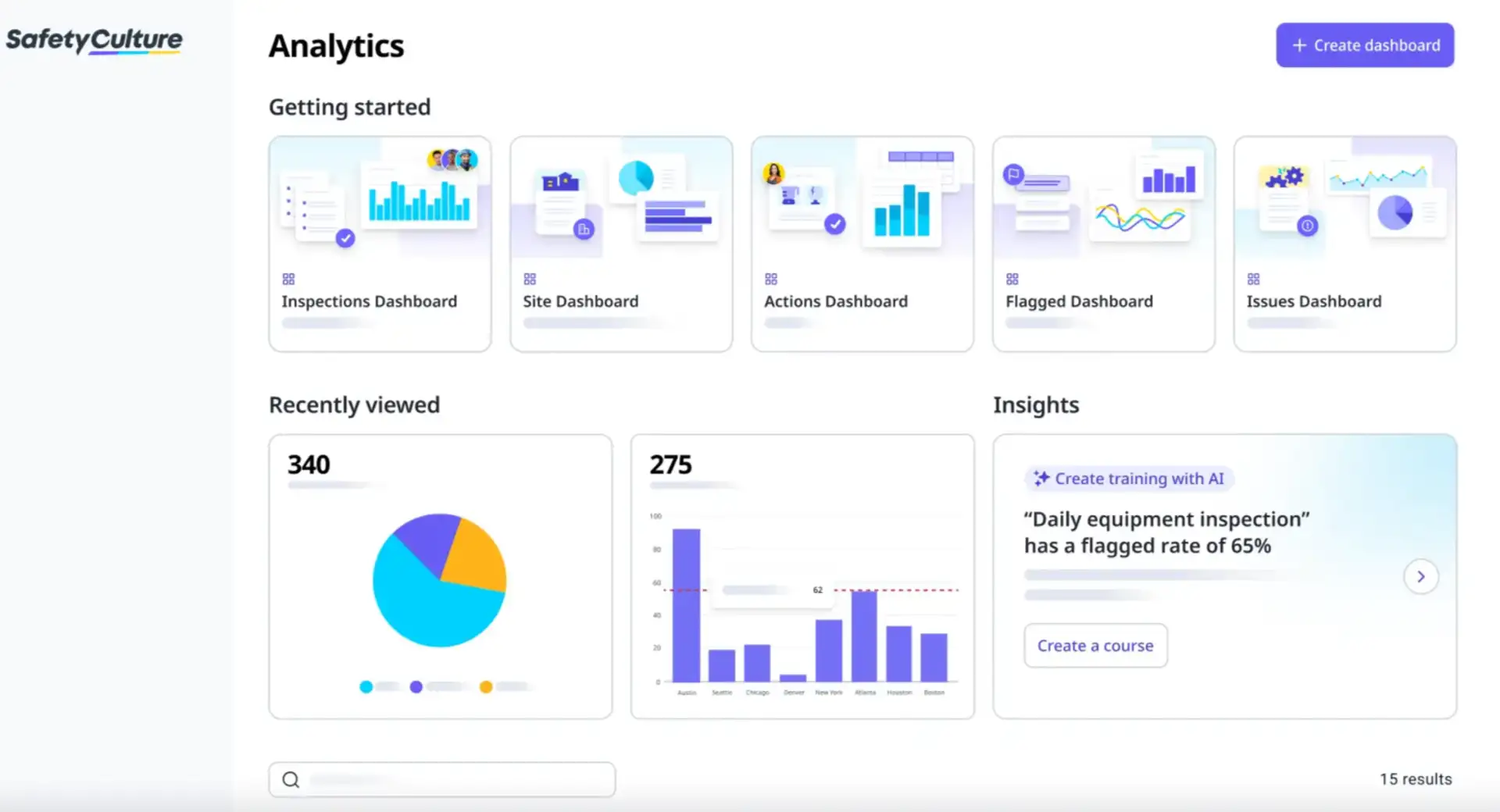
Why it stands out
With more than 120,000 public templates—many tagged for retail, food safety, and loss prevention—iAuditor lets chains digitize audits in days, not months. Conditional logic, drag-and-drop editing, and a built-in “Actions” module mean inspectors can snap photos, score issues on the spot, assign follow-ups, and auto-email branded reports before they leave the sales floor.
Key features
Massive checklist & template library covering safety, merchandising, and compliance.
Conditional questions & mandatory media to keep audits relevant and evidence-rich.
Offline capture & auto-sync so inspections run in dead-zone stockrooms.
Instant PDF/web report builder with custom branding and distribution lists.
Role-based dashboards & trend analytics for store, regional, and HQ views.
“Actions” workflow to assign owners, due dates, and check proof-of-completion.
SafetyCulture Sensors integration (temp, humidity, door) for always-on monitoring.
API & 60+ out-of-the-box connectors for BI, CMMS, or chat tools.
Pricing
Free for small teams (up to 10 users). Standard / Pro plan ≈ $24 per user / month.
Pros
Fastest deployment on the market thanks to its template marketplace.
Robust photo/video capture and slick, regulator-ready reporting.
Optional sensors and advanced analytics in higher tiers.
Cons
Custom integrations, SSO, and sensor data all require upper-tier plans.
Template library can feel bloated; periodic removals disrupt saved links.
2. TARGPatrol
TARGPatrol – a free-to-start, mobile-first platform built for boutiques and franchise operators that need enterprise-grade oversight without enterprise-grade pricing. Smart checklists, GPS / QR / NFC-verified audits, and auto-assigned corrective tasks keep every branch on brand—even when the ops budget is tight.
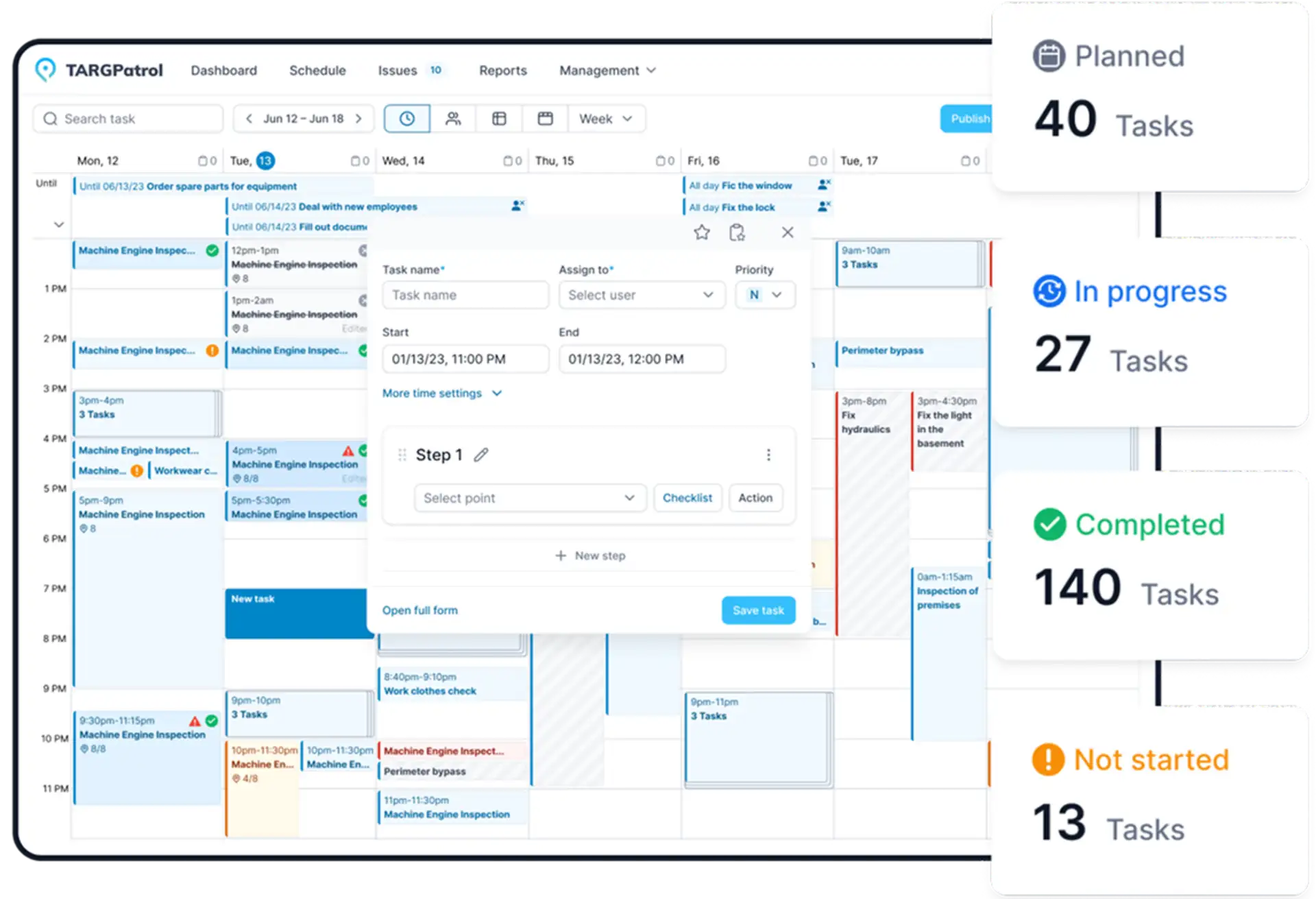
Why it stands out
Most audit apps charge per seat from day one; TARGPatrol’s forever-free tier covers full store walks, geo-verified check-ins, unlimited photo evidence, and offline sync for up to 20 locations. When the business scales, a single paid tier—$15 per user / month—unlocks deep analytics, data exports, and open API access, so brands can grow without switching tools.
Key features
Smart checklists with risk-weighted scoring, version control, and mandatory media uploads.
Geo-verified inspections via GPS zones, QR codes, or NFC tags to stop pencil-whipped walkthroughs.
Time-stamped photo & video evidence plus markup tools (arrows, circles, notes) for crystal-clear fixes.
Instant task workflows that assign owners, deadlines, priorities, and automatic escalations.
Incident & hazard reporting—one tap logs spills, safety risks, or security events with location and media.
Centralized analytics dashboards with heat-maps, exportable CSV/PDF reports, and store-vs-store benchmarking.
Push notifications & reminders so teams never miss a walk-through, follow-up task, or policy update.
Offline operation keeps audits running in dead-zone basements; data syncs the moment signal returns.
Open API & webhooks (paid tier) to pipe inspection data into payroll, CMMS, or BI systems.
Pricing
Free Plan — available for small businesses and trial use. Paid Plans — start at $15/user/month, with additional features and scalability for larger teams.
Pros
Generous free tier—ideal for 1-to-20-store chains just starting formal audits.
Consumer-grade mobile UI; staff learn the basics in minutes, not days.
Quick setup—drag-and-drop builder, CSV user import, and no mandatory onboarding fees.
Cons
Smaller integration marketplace; advanced connectors require the paid API tier.
Limited predictive analytics—heat-maps and trend charts are solid, but no AI forecasting yet.
3. Zenput
Zenput – an operations-execution platform purpose-built for multi-unit restaurants, grocers, and convenience chains, pairing sensor-driven food-safety logs with smart mobile audits and live dashboards.
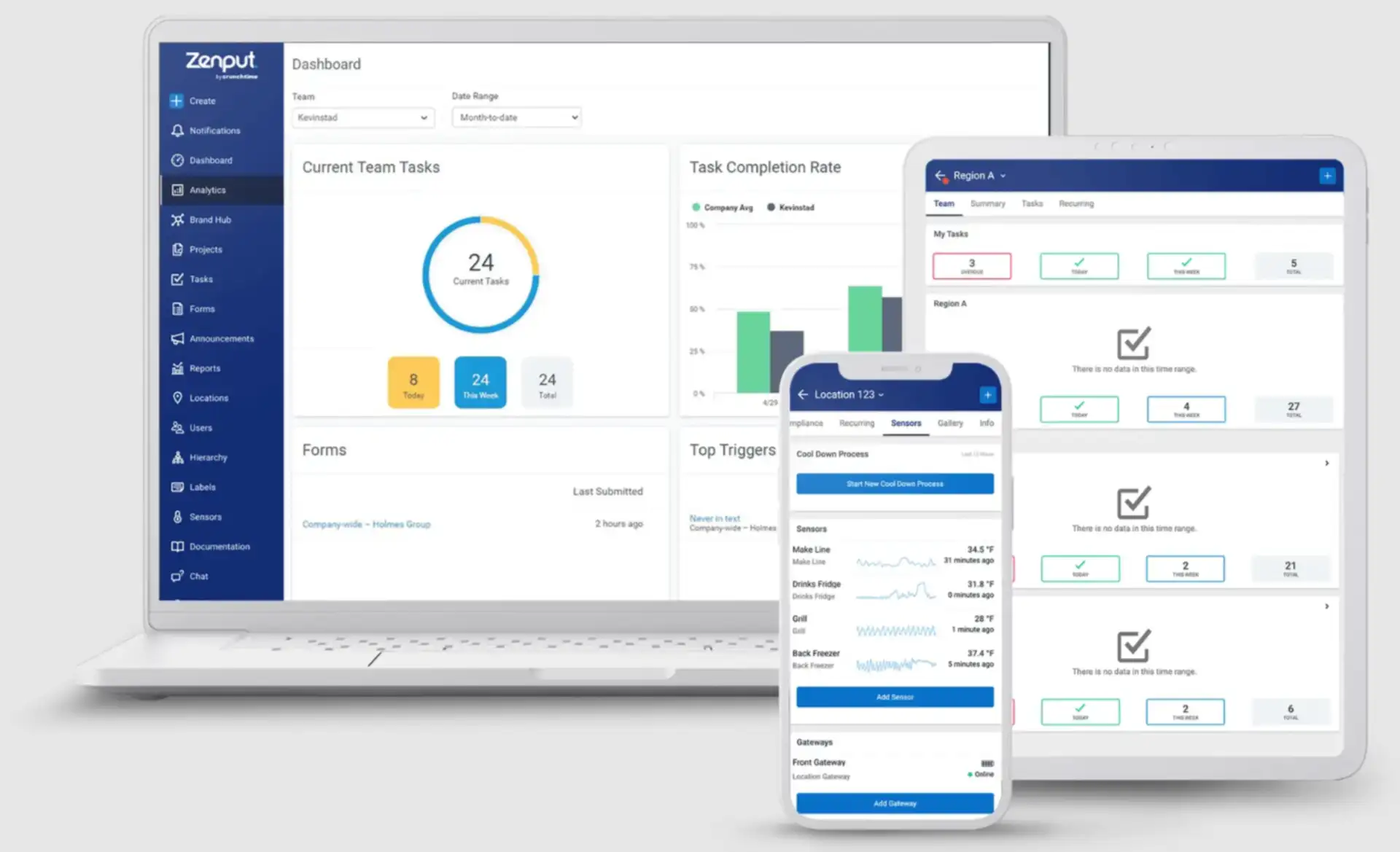
Why it stands out
Born in quick-service kitchens, Zenput plugs Bluetooth probes, cold-chain sensors, and prep-label printers straight into its checklists. That hardware/software combo lets brands track line temps, HACCP steps, and promo rollouts in one workflow — ideal for retailers with tight food-safety mandates and intricate brand standards.
Key features
Conditional, photo-rich smart checklists that hide or reveal questions based on earlier answers.
Automatic task creation & escalation paths so unresolved hazards bubble up to regional ops.
Real-time dashboards & trend analytics comparing stores, regions, and shifts at a glance.
Sensor integrations for Bluetooth thermometers, label printers, and IoT cold-chain devices.
Push notifications & brand-wide scheduling to roll out new procedures overnight.
Pricing
Three subscription tiers—Essentials, Premium, and Advanced—priced by quote; exact cost depends on location count, sensor mix, and feature bundle.
Pros
Deep, ready-made food-safety workflows right out of the box.
Unlimited above-store users in every tier—regional and HQ leaders view data at no extra seat cost.
Robust escalation logic and task analytics tailored for multi-unit operations.
Cons
No public price list, so budget planning requires a sales call.
Users occasionally report reporting-dashboard lag and initial configuration complexity compared with lighter audit apps.
4. GoAudits
GoAudits – a budget-friendly inspection platform that lets retail managers build custom checklists (or start from a rich template library), run store walks entirely offline, and fire off polished compliance reports in seconds — without blowing the budget.
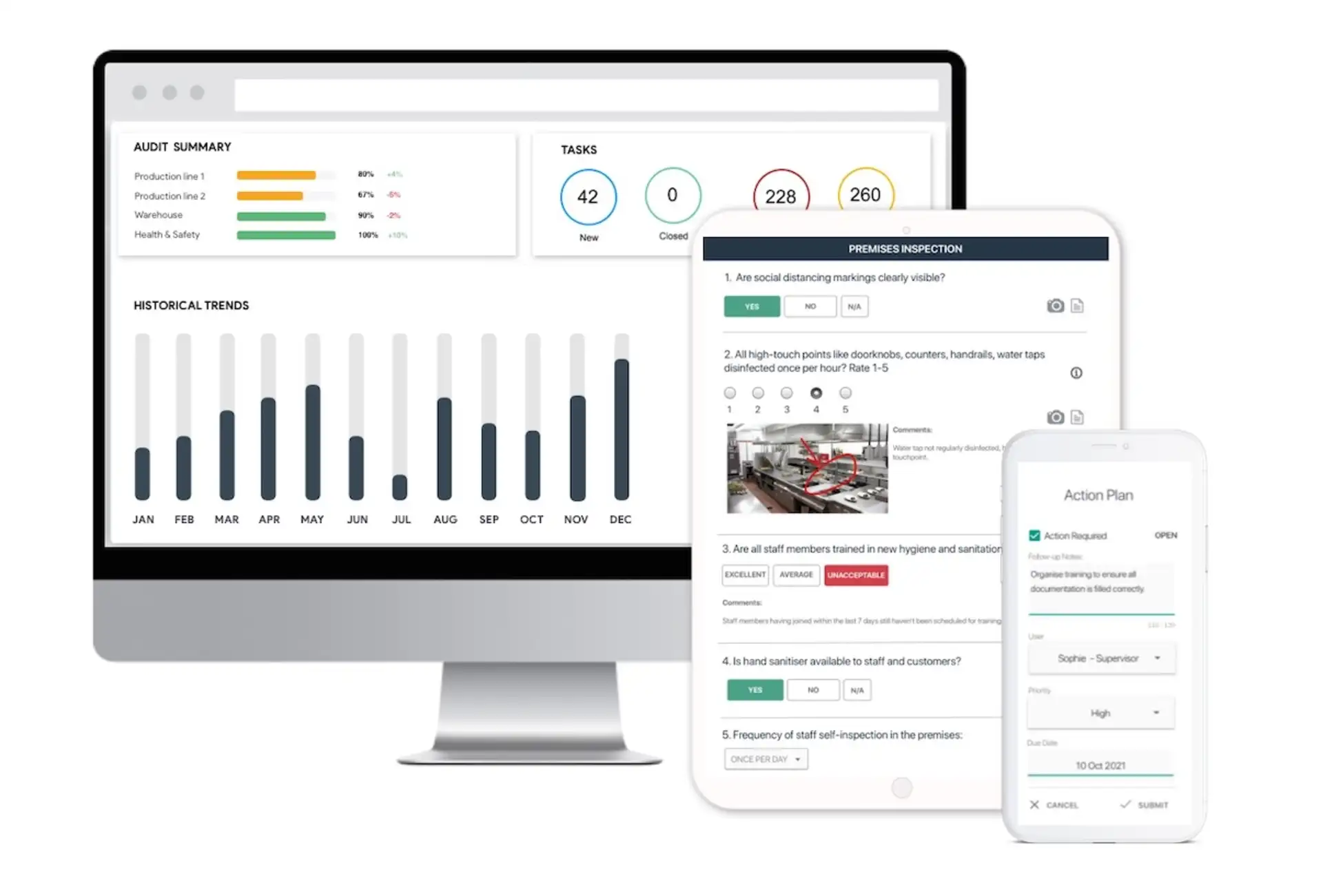
Why it stands out
GoAudits packs dynamic checklists, photo-rich evidence capture, and one-click PDF generation into a lightweight app priced for smaller chains. Even in basement stockrooms with no signal, audits keep rolling; the moment connectivity returns, data syncs to the cloud and lands in managers’ inboxes ready for action.
Key features
Drag-and-drop checklist builder plus a retail-specific template library for safety, merchandising, and loss-prevention standards.
True offline mode with auto-sync on reconnection, so inspections never stall in dead zones.
Time-stamped photo & video evidence with markup tools to highlight exactly what needs fixing.
One-click PDF or web report generation—handy for regulators or franchise dashboards.
Role-based dashboards, heat-maps, and task workflows that flag recurring issues and track closure in real time.
Pricing
Published at roughly $10–12 per user per month with a 14-day free trial, making it one of the most affordable full-feature audit apps on the market.
Pros
Lowest publicly listed price among comprehensive inspection platforms.
Lightning-fast PDF report delivery—ideal when auditors or regulators need same-day proof.
Clean, intuitive interface; frontline teams can learn the basics in a single shift.
Cons
Fewer deep-dive analytics and predictive insights than higher-priced rivals.
Smaller integration marketplace; custom API connections may require extra fees or developer time.
5. YOOBIC
YOOBIC – an all-in-one frontline app that unites digital store visits, task tracking, team chat, and micro-learning, giving HQ live, drill-down insight into brand, safety, and promotion execution across every location.
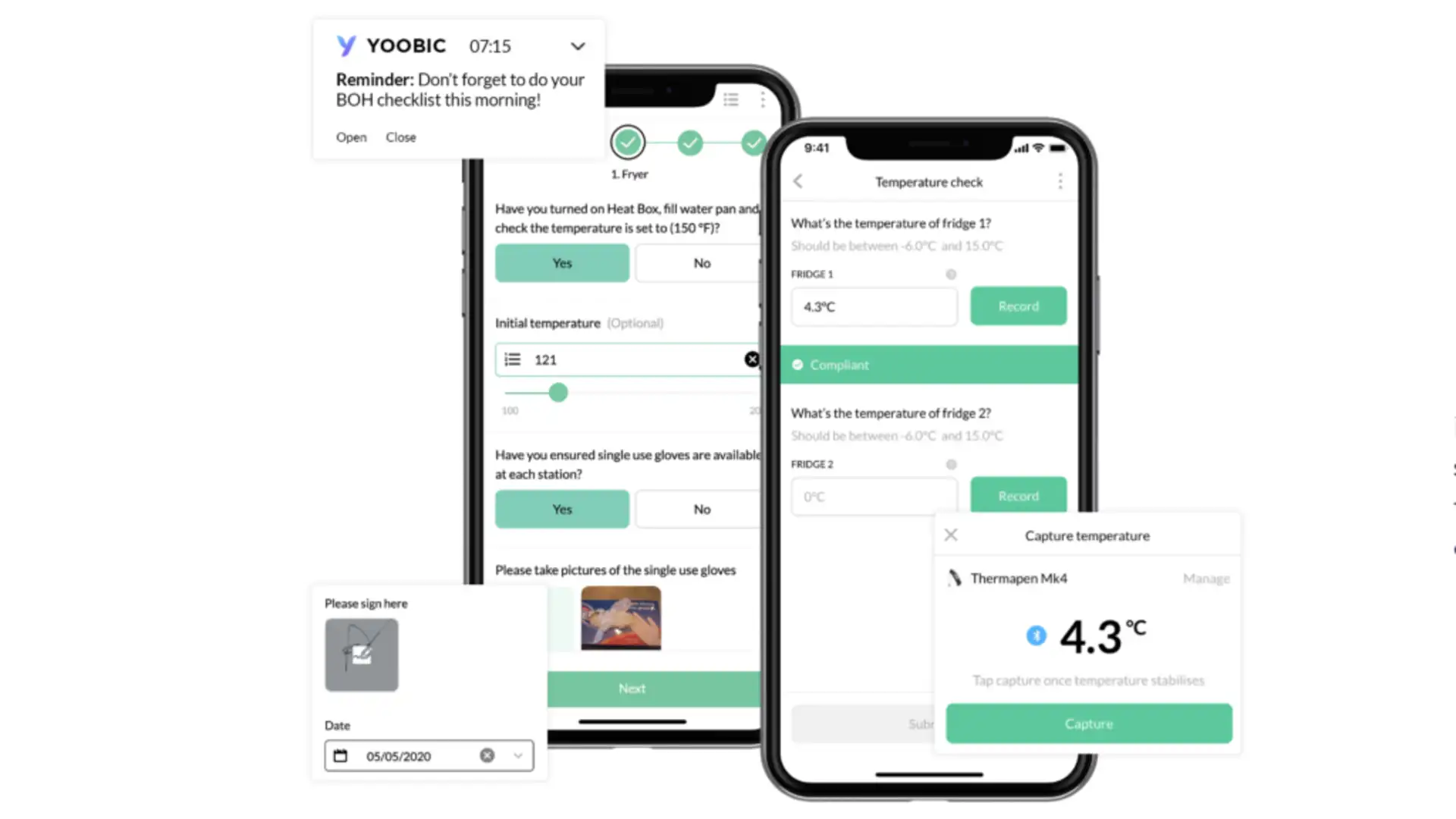
Why it stands out
Beyond standard audits, YOOBIC bundles task management, two-way communications, and mobile training into a single workflow. Headquarters can broadcast new guidelines, verify execution with photo evidence, assign follow-up tasks, and close the loop by serving bite-size lessons—all without forcing staff to juggle multiple apps.
Key features
Dynamic site-visit & audit forms with conditional questions and mandatory photos/videos for airtight evidence.
Action-plan tracking that assigns owners, deadlines, and escalations until every corrective item is closed.
Real-time dashboards at HQ, regional, and store levels, surfacing compliance scores and hotspot analytics.
Offline capability so field teams complete audits in dead-zone stockrooms; data syncs automatically on reconnection.
Built-in chat and micro-learning modules to clarify tasks instantly and deliver short, mobile courses on new standards.
Pricing
Modular, quote-based pricing; cost scales by number of users or locations and includes implementation support.
Pros
Combines audits, tasks, comms, and training in one place—no app-hopping for staff.
Cloud architecture is highly scalable, supporting global retailers in dozens of languages.
“White-glove” onboarding plus unlimited media storage are included in standard contracts.
Cons
Can be over-featured and more expensive if a retailer only needs basic inspection functionality.
Broader feature set means a steeper learning curve compared with single-purpose audit apps.
Conclusion: Choosing the Right Retail-Inspection Software
Digital inspections have matured from a “clipboard replacement” into a strategic layer that drives safety, brand consistency, and operational speed across every aisle. The five platforms we reviewed — iAuditor, TARGPatrol, Zenput, GoAudits, and YOOBIC — cover nearly the full spectrum of needs, budgets, and organizational complexity. Below is an integrated conclusion to help you translate feature lists into a confident buying decision.
What Every Retail Inspection Platform Must deliver
Structured, media-rich checklists that turn vague observations into data.
Offline reliability so audits never stall in basement stockrooms.
Geo-verification (GPS, QR, NFC) to end “pencil-whipped” walk-throughs.
Instant corrective workflows—owner, deadline, escalation, proof-of-fix.
Role-based dashboards & exports for store managers, regional leads, and HQ.
Future-proofing via open APIs, sensor integrations, and a published roadmap.
All five contenders tick these baseline boxes, but each leans harder into a different value proposition.
Decision Checklist
1. Clarify your dominant pain point
Template depth? → iAuditor.
Food-safety sensors? → Zenput.
Budget & quick adoption? → GoAudits or TARGPatrol.
Unified audits + frontline training? → YOOBIC.
2. Map future integrations now
Will your inspection data feed payroll, CMMS, BI, or LMS tools in 12-18 months? Choose a vendor with open APIs and published throughput limits so you’re not throttled later.
3. Pressure-test offline performance
Run a pilot in the worst connectivity zone of a key store. Record time-to-sync, photo upload fidelity, and battery drain.
4. Audit the audit UX
Give the mobile app to a floor associate with <10 minutes of training. If they complete a checklist with full evidence capture, you’re on the right track.
5. Calculate true cost of ownership
Factor seat price, setup fees, sensor hardware, API surcharges, training hours, and potential consulting. A cheaper license with a costly rollout can eclipse a premium plan that deploys in days.
Final Word on Retail Inspections
A scuffed tile or dim exit sign may look minor—but in the age of social media and instant reviews, one lapse can ripple faster than any “grand opening” campaign. Digital inspection platforms are the guardrails that keep retail operations safe, compliant, and on-brand before customers notice a flaw.
For cost-conscious independents: TARGPatrol or GoAudits will professionalize audits without torching the budget.
For scale-obsessed chains: iAuditor’s template depth and sensor add-ons justify the higher tier.
For food-centric, multi-unit operations: Zenput’s sensor ecosystem is worth the configuration effort.
For global brands aiming to unite audits, comms, and training: YOOBIC offers the broadest single-app footprint.
Choose a platform that solves today’s gap, scales into tomorrow’s data landscape, and keeps every store inspection-ready—long before a shopper spots what you missed.
